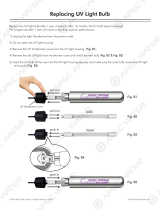
SAFETY PRACTICES TO AVOID INJURY
When properly cared for, your grill will provide safe, reliable service for many years. However, extreme
care must be used as the grill produces intense heat that can increase accident potential.
When using this appliance basic safety practices must be followed, including the following:
• Do not repair or replace any part of the grill unless specifically recommended in this manual. All
other service should be referred to a qualified technician.
• The grill is for outdoor use only.
• Children should not be left alone or unattended in an area where the grill is being used. Do
not allow children to sit, stand or play on or around the grill at any time.
• Do not store items of interest to children around or below the grill or cart. Do not allow children
to crawl inside the cart.
• Never let clothing, pot holders or other flammable materials come in contact with or too close to
any grate, burner or hot surface until it has cooled. The fabric could ignite, causing serious
personal injury.
• For personal safety, wear proper apparel. Loose fitting garments or sleeves should never be
worn while using this appliance. Some synthetic fabrics are highly flammable and should not
be worn while cooking.
• Only certain types of glass, ceramic, earthenware, or other glazed utensils are suitable for grill
use. Other types of materials may shatter with sudden temperature changes. Use only low or
medium heat settings in accordance with the manufacturer’s guidelines.
• Do not heat unopened food containers as a build-up of pressure may cause the containers to
burst.
TESTED IN ACCORDANCE WITH ANSI Z21.58
LATEST STANDARD and CSA 1.6-2007
STANDARD FOR OUTDOOR COOKING GAS
APPLIANCES. THIS GRILL IS FOR OUTDOOR
USE ONLY.
Check your local building codes for the proper
method of installation. In the absence of local
codes, with either the National Fuel Gas Code,
ANSI Z223.1/NFPA 54, or CSA B149.1, Natural
Gas and propane Installation Code. Electrical
Code, ANSI/NFPA 70.
CCALIFORNIA PROPOSITION 65-WARNING
The burning of gas fuel generates some
by-products, which are known by the State of
California to cause cancer or reproductive harm.
To minimize exposure to these substances, always
operate this unit according to the care and use
manual, ensuring you provide good ventilation
WARNING
Electrical Grounding Instructions for Rotisserie Motor – This appliance (rotisserie motor) is
equipped with a plug and should be plugged directly into a properly grounded receptacle. When
installed, must be electrically grounded in accordance with local codes or in the absence of local codes,
with the National Electrical Code, ANSI/NFPA 70 or the Canadian Electrical Code, CSA C22.1. DO NOT
cut or remove the grounding prong from this plug.
1. To protect against electrical shock, do not immerse cord or plugs in water or other liquids.
2. Unplug from the outlet when not in use and before cleaning. Allow to cool before putting on or
taking off parts.
3. Do not operate any outdoor cooking gas appliance with a damaged cord, plug, or after the appliance
malfunctions or has been damaged in any manner. Contact the manufacturer for repair.
4. Do not let the cord hang over the edge of a table of touch hot surface.
5. Do not use an outdoor cooking gas appliance for purposed other than intended.
6. When connecting, first connect plug to the outdoor cooking gas appliance then plug appliance into
the outlet.






















